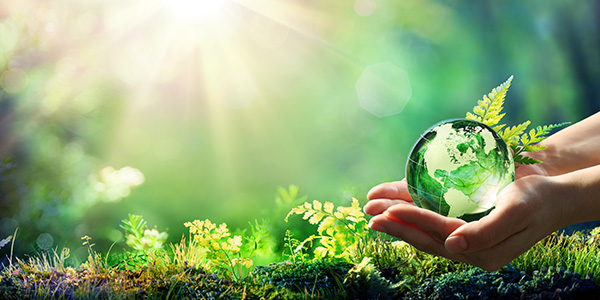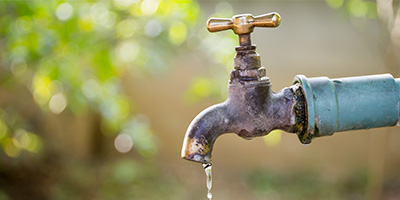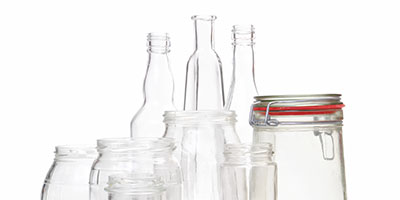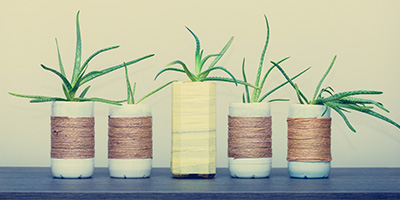What Can’t Be Recycled?

What Not to Recycle
It feels great to do your part in helping the environment, including filling up your recycling bin for collection every week. But if you toss items that cannot be recycled, while your intentions are good, those items may contaminate the entire load — in the worst-case scenario sending it all to the landfill.
Fortunately, you can get around this by getting up to speed on non-recyclable items. In the guide that follows, you’ll find several of the most common things that cannot be recycled.
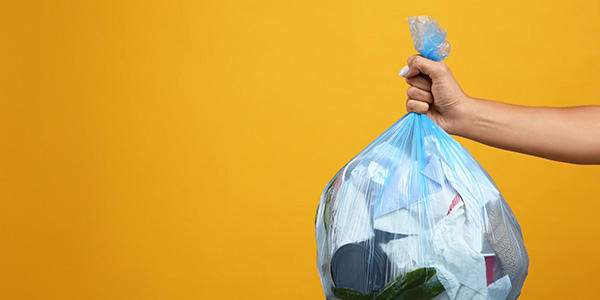
4 Things You Can't Recycle
Avoid tossing the following non-recyclable items into your curbside recycling bin at all costs.
1. Plastic Bags
Plastic bag recycling is a bit tricky. While you can recycle them — they cannot go in most curbside recycling bins.

One common item that can be recycled, but not at the curbside, are plastic films and bags. These are your typical grocery, laundromat and shopping bags. These materials are difficult to separate at an MRF [materials recovery facility] and become tangled in the current sortation equipment.
Andy Brewer, Associate Director of Sustainability & Materials, Plastics Industry Association
You should also avoid bagging your recyclables in plastic before you throw them in your bin. The good news is changes are coming that may allow for curbside plastic bag recycling soon.
“There is a shift occurring and a higher level of demand for recycled films and bags. MRFs around the country are beginning to include plastic film and bag collection in their recyclables, and technology to handle these streams is being added to current operations to increase collection rates,” Brewer says.
Whatever you do, don’t toss plastic bags in your trash. Collect them until you can drop them off at a collection site, which can often be found near the front of grocery stores. “If your current curbside collection does not allow for plastic bags, you can check locally for convenient, nearby drop-off locations,” Brewer notes. “Most large retailers have drop-off centers for plastic film and bags, amongst other items.”
If you’re feeling creative, you can also learn how to turn a plastic bag into a kite or try your hand at one of these DIY plastic bag project ideas.
What Plastics Cannot Be Recycled?
All plastic containers are labeled with a resin identification code (RIC) that tells you which kind of plastic it is. You can find the RIC near the chasing arrow recycling symbol.
Plastics assigned number 1 — polyethylene terephthalate (PETE), such as water bottles, soda bottles and peanut butter jars — or 2 — high-density polyethylene (HDPE), such as milk jugs, shampoo bottles and laundry detergent containers, as well as 5-gallon buckets — are typically accepted in curbside recycling. A good rule of thumb is if the neck of the container is narrower than the base, it can usually be recycled.
But numbers 3 to 7, which include the following plastic goods, are usually non-recyclable items:
- Squeeze bottles
- Coffee cup lids
- Styrofoam cups
- To-go containers
- Yogurt containers
- Kitty litter buckets
- Laundry baskets
- Straws
- Plastic solo cups
- Toys
- Egg cartons made of plastic or Styrofoam
- Sippy cups
If you’ve refilled a typically recyclable plastic container, such as a milk jug, with something else, this may also make it non-recyclable.
“For example,” Brewer says, “a consumer will use a milk jug to collect drained oil during an oil change. It is very difficult for the recycler to identify what contaminant is inside of the reused plastic product and any hazardous material could contaminate an entire batch of recycled material. These scenarios cause issues in the recycling stream when the materials are washed and re-pelletized.”
If you’re still unsure, contact your local recycler to find out what plastics cannot be recycled in your area.
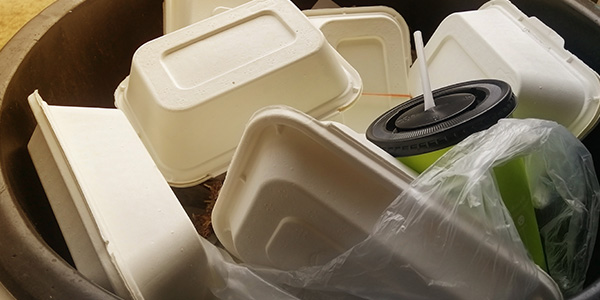
2. Many Types of Food Packaging
You can’t recycle anything contaminated with food scraps, even if it’s paper or cardboard. The U.S. Environmental Protection Agency suggests, “‘Spatula-clean’ is clean enough to recycle!”
We know you’re probably wondering, “Are pizza boxes recyclable?” The answer is yes — as long as there isn’t food stuck to them. Some grease is OK but make sure to remove any stuck-on cheese.
Most curbside recyclers don’t accept:
- Polystyrene foam (styrofoam)
- Plastic utensils
- Cups with wax or plastic coatings, such as coated paper coffee cups
- Potato chip bags
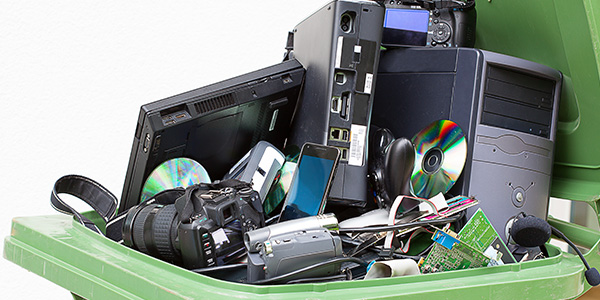
3. Most Electronics
Recycling electronics in your curbside bin is a major no-no. But similar to plastic bags, while recycling electronics curbside is a no-go, they can — and should — be recycled elsewhere. Because electronics often contain hazardous materials, they’re also typically prohibited in landfills. To dispose of them properly you’ll need to find an electronics recycling program in your area.
Review our Electronics Disposal Guide for tips on where you can donate or recycle electronics such as televisions, computers, cellphones, cameras, gaming consoles and more.
4. Food Waste
Tempted to toss an apple core or a half-eaten box of popcorn into your recycling bin? Or maybe a brown paper bag full of grass clippings? Don’t do it.
“[Another] item that cannot be added to a curbside stream are compostable products,” Brewer says. “These materials require specific conditions found at composting facilities to biodegrade fully.”
More U.S. cities are adding curbside composting to their regular trash pickups. This is where your organic waste should go if it’s offered in your area. If not, you’re in luck, because building your own compost bin is surprisingly simple.
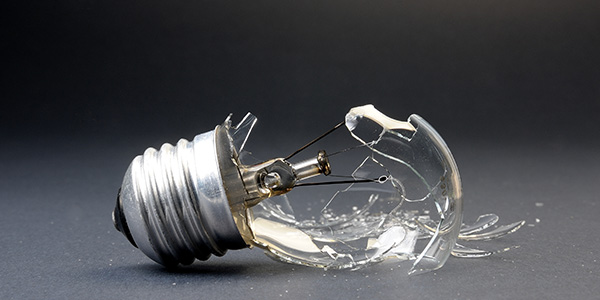
More Things You Can’t Recycle
Many non-recyclable items don’t fit neatly into a category, making it difficult to figure out what’s allowed and what’s not. If in doubt contact your local recycler, but keep these general recycling rules in mind too.
- Flexible packaging — If the package is soft and pliable, like a potato chip bag or juice pouch, it’s made from multiple materials and can’t be recycled.
- Long items that tangle easily — Garden hoses, Christmas lights, leashes and chains have one thing in common. If they make it to a recycling facility, they can seriously damage equipment and injure workers.
- Textiles — Many curbside recycling programs don’t take textiles, such as clothing, curtains and sleeping bags. If you have fabric items in good condition, consider donating them. Even if they’re not usable, many communities offer specialized textile recycling services.
- Scrap metal — Most scrap metal is recyclable — just not in your curbside bin. In many cases, you can recycle scrap metal for cash payments at a local scrap yard.
- Shredded or colored paper —While shredded paper is technically recyclable, it’s too small to sort and may get stuck in machinery or end up on the floor at the processing center. You may be able to find a local recycling resource that accepts shredded paper or you can use it in your homemade compost bin. Colored paper isn’t accepted because it will release its color, contaminating other items.

Recycling Trivia Fun Fact — Can You Recycle Recycled Items?
It depends on the material. Plastics can only be recycled once or twice before being turned into something else, like clothing. Paper may be recycled about eight times before it’s turned into a paste destined for egg cartons or newspaper. But glass and metal? They can be recycled again and again — infinitely — making them the ultimate eco-friendly materials.
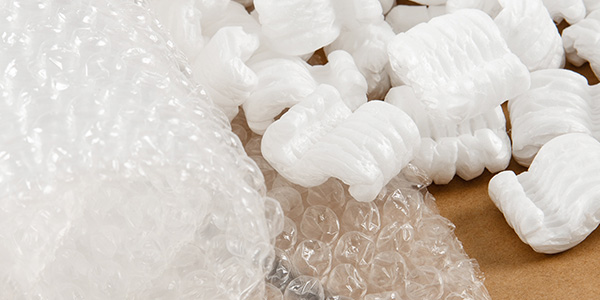
What else can’t be recycled? Below are 15 more examples of what not to toss in your recycling bin:
- Windows
- Broken glass
- Medical waste, such as syringes
- Incandescent light bulbs
- Packing peanuts (polystyrene foam)
- Dirty diapers
- Hangers
- Bubble wrap
- Batteries
- Rubber balls
- Tires
- Razor blades
- Wood
- Mirrors
- Ceramic items, like dishes
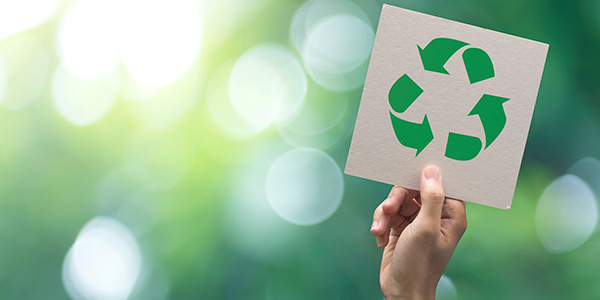
Why Does Recycling Matter?
Along with reducing the burden on U.S. waste disposal sites, recycling reduces the need to manufacture new items, saving valuable resources like timber and water. You may think recycling one plastic bottle or an aluminum can doesn’t make a big difference, but each item that’s recycled has value.

"A … misconception is that the products a homeowner could recycle are not valuable, and so not recycling is not that big of a deal. These materials, especially the plastic products, are extremely valuable and have the potential to be recycled and reused. There is value in the collection of plastic materials because the demand for recycled content is growing rapidly."
And as technology advances and innovations continue to evolve, recycled content can now be processed back into food packaging, medical products and for industrial applications. Additionally, the use of recycled content reduces the need for natural resources during the production of virgin resin.”
Andy Brewer, Associate Director of Sustainability & Materials, Plastics Industry Association
There are considerable energy savings, too. For example, recycling 10 plastic bottles saves enough energy to run your laptop for 25 hours, according to the EPA. You might not think about it, but recycling also has economic benefits. A single year of recycling in the U.S. generates 681,000 jobs and $37.8 billion in wages, the EPA notes.
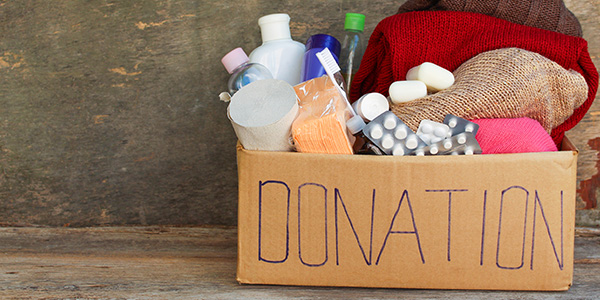
What to Do With Things You Can’t Recycle
This is not an exhaustive list of non-recyclable items, so be sure to contact your local recycling center for info on things that cannot be recycled in your area. You can also find helpful information on getting rid of unacceptable materials in our Bulk Waste Disposal Guide.

"Many communities may offer local drop-off locations for different materials. These centers may not be as convenient as putting materials in a curbside bin, but they are still great resources for those dedicated to recycling … All curbside recycling streams have directories on what types of plastics can be added to your bin, some even with pictures and definitions of materials. One of the newest tools, created by The Recycling Partnership, allows you to chat with a virtual assistant that tells you what you can recycle.”
And as technology advances and innovations continue to evolve, recycled content can now be processed back into food packaging, medical products and for industrial applications. Additionally, the use of recycled content reduces the need for natural resources during the production of virgin resin.”
Andy Brewer, Associate Director of Sustainability & Materials, Plastics Industry Association
If an item cannot be recycled, think of ways to reuse or donate it before tossing it in the trash.
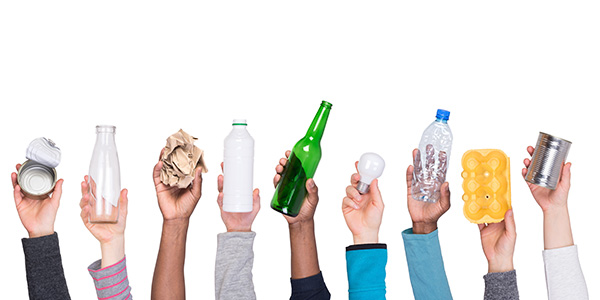
What Can Be Recycled?
We’ve covered what can’t be recycled, but it’s also helpful to know what can go in your recycling bin. This includes:
- Paper
- Cardboard boxes
- Cereal boxes
- Paper towel rolls
- Newspapers
- Magazines
- Junk mail
- Aluminum cans and foil
- Food cans
- Glass jars and bottles
- Milk jugs
- Frozen food boxes
- Plastic water bottles and containers
- Plastic shampoo/detergent bottles
- Phone books
Why Is My Recycling Being Picked Up by a Garbage Truck?
You may also wonder why sometimes it appears as though your recycling is being picked up by a garbage truck. Contrary to popular belief, this doesn’t mean it’s going to the dump, so don’t let this keep you from recycling as much as you can.
“One of the biggest misconceptions from homeowners and consumers is that their curbside recycling is going straight to a landfill,” Brewer says. “This happens because the trucks for trash and recycling look the same, or sometimes are the same, and consumers think it is all going to the same place. Trash trucks are expensive, and some communities may use the same truck to pick up the trash and then later pick up recycling.”
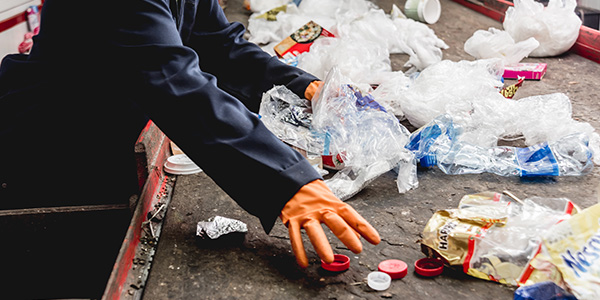
Why Recycling Rules Vary by Municipality
Recycling rules vary by city and town because there is no federal recycling program. The approximately 20,000 communities in the U.S. decide for themselves what can and can’t be recycled in each area. So, while some items can’t be recycled anywhere, your town’s rules on what not to recycle might be different from the recycling rules of the next town over.
Decisions about recycling rules — and the success of any given recycling program — ultimately fall not only to state and city officials but also to recyclers, haulers and product manufacturers, along with members of the community.
The take-home message here is when in doubt, contact your local recycling program to find out about items that cannot be recycled.
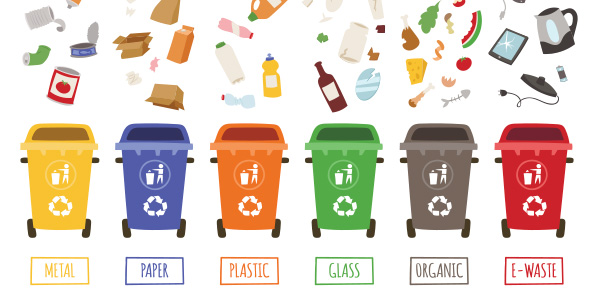
Where exactly does all your trash go? Find out in our guide!
Beware of Wishcycling
We’ve all been there — holding an empty food container or random plastic item and wondering if it should go in the recycling or the trash. More often than not, you probably toss it in your recycling bin in the hopes that it will get remade into a cereal box or yoga mat. This is wishful recycling, also known as wishcycling.
Though well-intentioned, putting non-recyclable items into your recycling bin and hoping for the best can backfire. When things that cannot be recycled are mixed with recyclable materials, it causes contamination that may damage expensive machinery, make it more difficult for workers to sort through the items and even cause otherwise recyclable materials to end up in the landfill.

"There is a common adage in the recycling industry: ‘When in doubt, throw it out.’ If you are not confident that a material can be recycled, then you should landfill it instead … It is always good practice to check first and know the materials that you can add to your curbside bin.”
Andy Brewer, Associate Director of Sustainability & Materials, Plastics Industry Association
